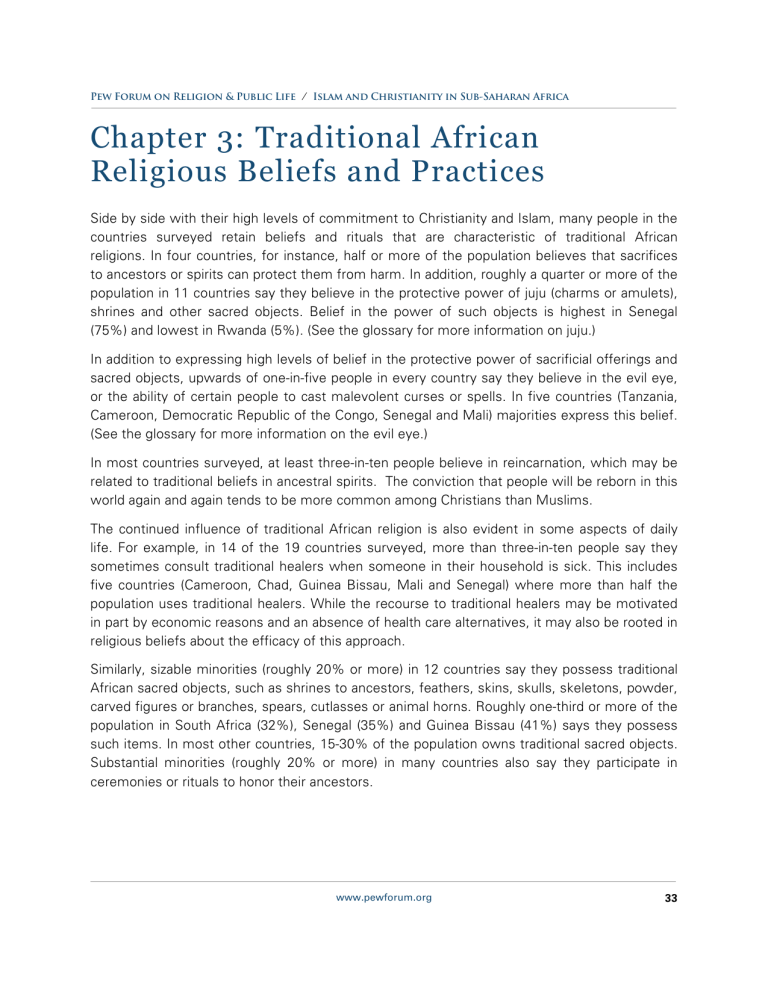
Pew Forum on Religion & Public Life / Islam and Christianity in Sub-Saharan Africa Chapter 3: Traditional African Religious Beliefs and Practices Side by side with their high levels of commitment to Christianity and Islam, many people in the countries surveyed retain beliefs and rituals that are characteristic of traditional African religions. In four countries, for instance, half or more of the population believes that sacrifices to ancestors or spirits can protect them from harm. In addition, roughly a quarter or more of the population in 11 countries say they believe in the protective power of juju (charms or amulets), shrines and other sacred objects. Belief in the power of such objects is highest in Senegal (75%) and lowest in Rwanda (5%). (See the glossary for more information on juju.) In addition to expressing high levels of belief in the protective power of sacrificial offerings and sacred objects, upwards of one-in-five people in every country say they believe in the evil eye, or the ability of certain people to cast malevolent curses or spells. In five countries (Tanzania, Cameroon, Democratic Republic of the Congo, Senegal and Mali) majorities express this belief. (See the glossary for more information on the evil eye.) In most countries surveyed, at least three-in-ten people believe in reincarnation, which may be related to traditional beliefs in ancestral spirits. The conviction that people will be reborn in this world again and again tends to be more common among Christians than Muslims. The continued influence of traditional African religion is also evident in some aspects of daily life. For example, in 14 of the 19 countries surveyed, more than three-in-ten people say they sometimes consult traditional healers when someone in their household is sick. This includes five countries (Cameroon, Chad, Guinea Bissau, Mali and Senegal) where more than half the population uses traditional healers. While the recourse to traditional healers may be motivated in part by economic reasons and an absence of health care alternatives, it may also be rooted in religious beliefs about the efficacy of this approach. Similarly, sizable minorities (roughly 20% or more) in 12 countries say they possess traditional African sacred objects, such as shrines to ancestors, feathers, skins, skulls, skeletons, powder, carved figures or branches, spears, cutlasses or animal horns. Roughly one-third or more of the population in South Africa (32%), Senegal (35%) and Guinea Bissau (41%) says they possess such items. In most other countries, 15-30% of the population owns traditional sacred objects. Substantial minorities (roughly 20% or more) in many countries also say they participate in ceremonies or rituals to honor their ancestors. www.pewforum.org 33 Pew Forum on Religion & Public Life / Islam and Christianity in Sub-Saharan Africa In total, the survey included questions about seven beliefs common to traditional African religions (belief in the protective power of Traditional African Religious Beliefs and Practices certain spiritual people, the power % exhibiting high levels of belief and practice of juju and other sacred objects, the evil eye, witchcraft, evil spirits, the Median results: protective power of sacrificial offerings to ancestors and reincarnation). The survey also included questions on four traditional religious practices Among general population in… (visiting traditional healers, owning sacred objects, participating in ceremonies to honor ancestors and participating in traditional puberty rituals). These 11 items can be combined into a single scale to provide an overall picture of where involvement with traditional African religions is highest. This analysis shows that more than half of the respondents in three countries show high levels of traditional African religious beliefs and practices (believing or participating in six or more of the 11 items). In eight other countries, between one-quarter and one-half of respondents rank high on the scale. Moreover, traditional African religious beliefs and practices are common in predominantly Muslim countries, in countries with a more even mix of Christians and Muslims, and in predominantly Christian countries. These beliefs and practices are most prevalent in religiously mixed Tanzania (where 62% of the population ranks high on the scale). Q51c, f-k/Q68f-i. Questions measure belief in reincarnation, witchcraft, evil spirits, the protective power of sacrifices to spirits or ancestors, juju or shrines, “evil eye” or curses, and the protective power of spiritual people as well as possession of traditional African sacred objects, participation in traditional ceremonies to honor ancestors, participation in traditional puberty rituals and use of religious healers. Those reporting 6-11 of these attributes are classified as having high levels of traditional African religious beliefs and practices. www.pewforum.org 34 Pew Forum on Religion & Public Life / Islam and Christianity in Sub-Saharan Africa More than half of those surveyed in predominantly Muslim Senegal (55%) and Mali (52%) also exhibit high levels of traditional African religious belief and practice, as do roughly half of respondents in predominantly Christian Cameroon. The countries that rank lowest on the scale include predominantly Christian Rwanda, Ethiopia, Zambia and Kenya. Religiously mixed Nigeria and predominantly Muslim Djibouti also exhibit relatively low levels of engagement. There is no clear pattern among Christians or Muslims on levels of engagement with African traditional religions. In Chad, Tanzania, Liberia and the Democratic Republic of the Congo, more Muslims than Christians exhibit high levels of belief and practice on these measures, while in Guinea Bissau, Cameroon, Ghana and Kenya more Christians than Muslims rank high on the scale. For the most part, fewer respondents in the East African countries surveyed score high on this scale compared with those in West Africa. www.pewforum.org 35


